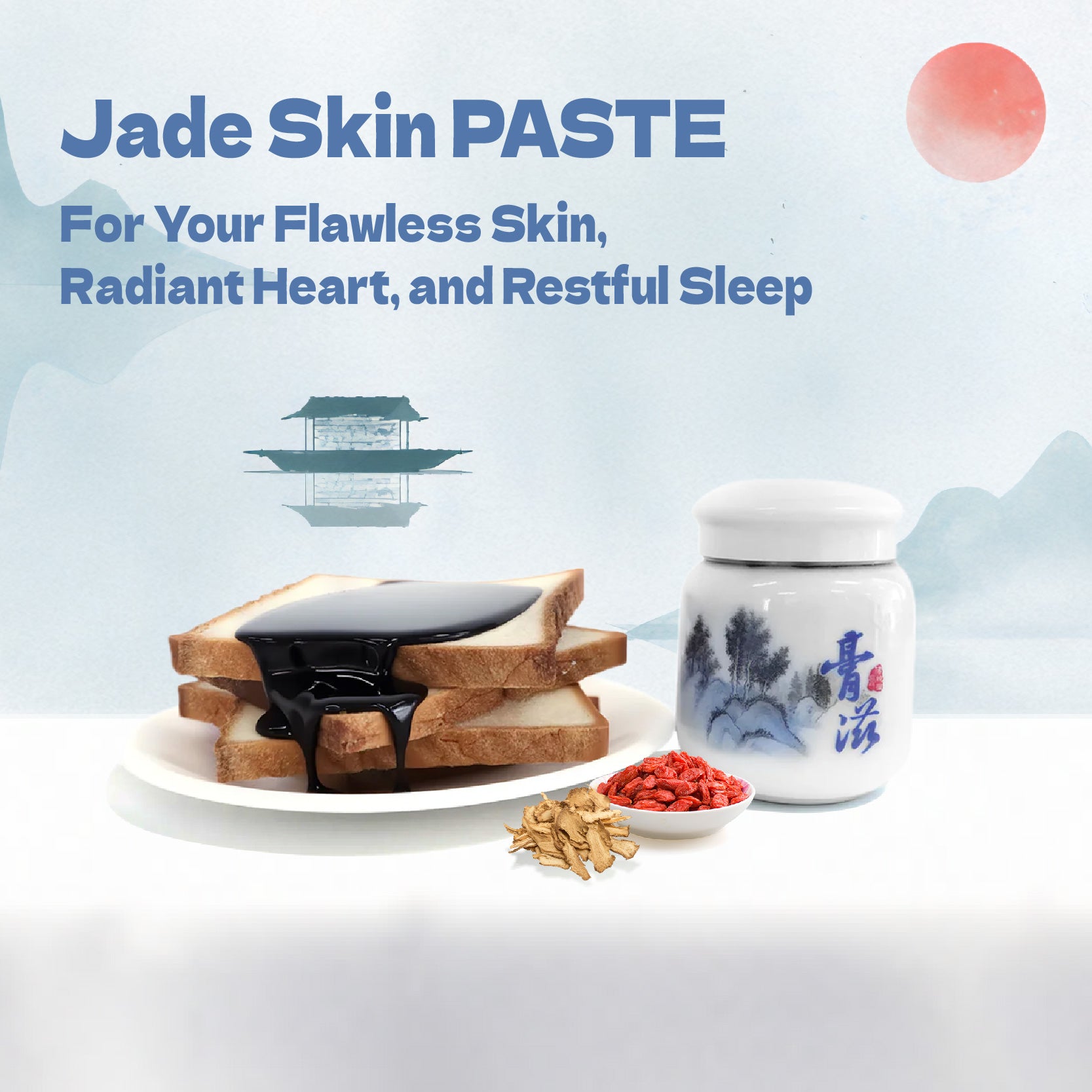
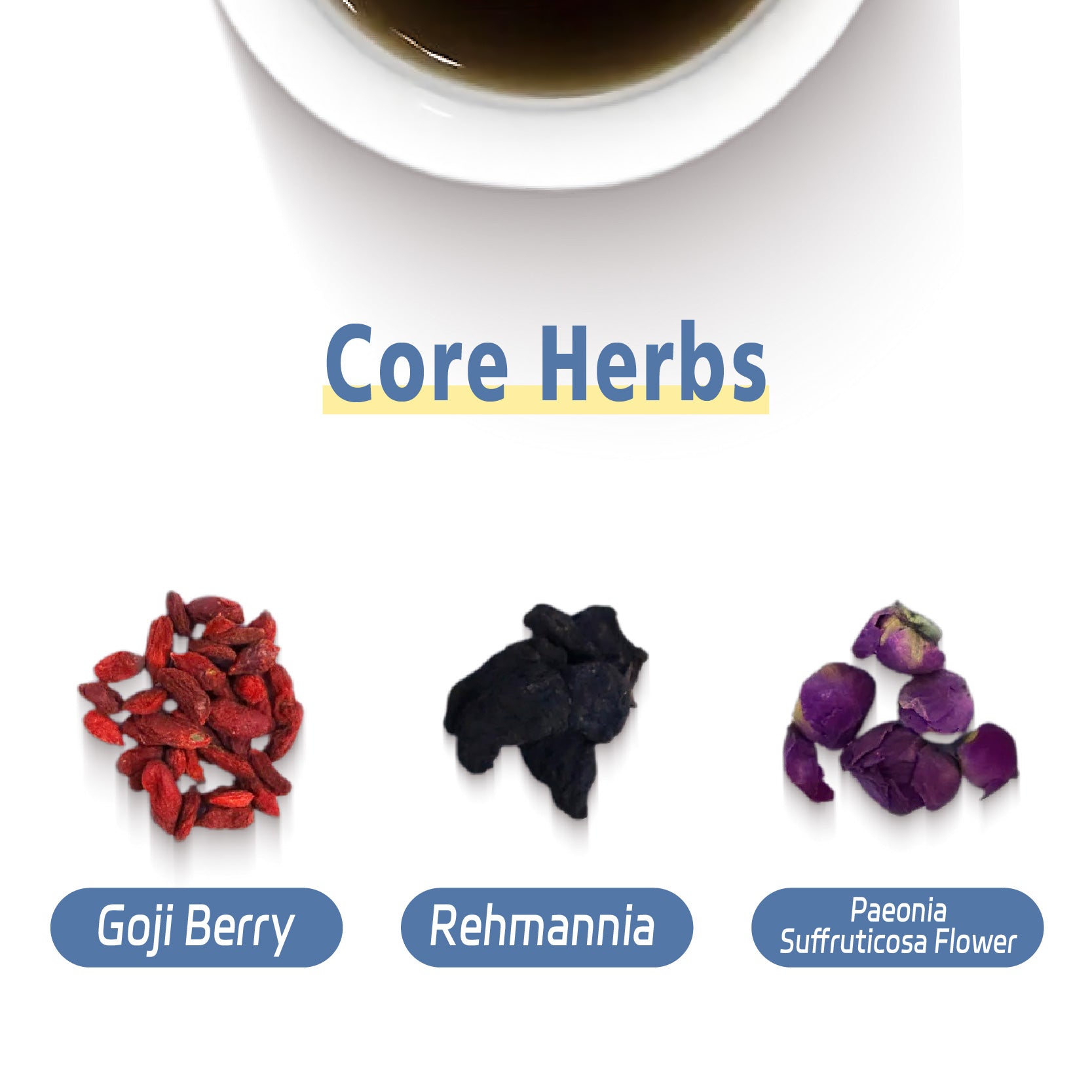
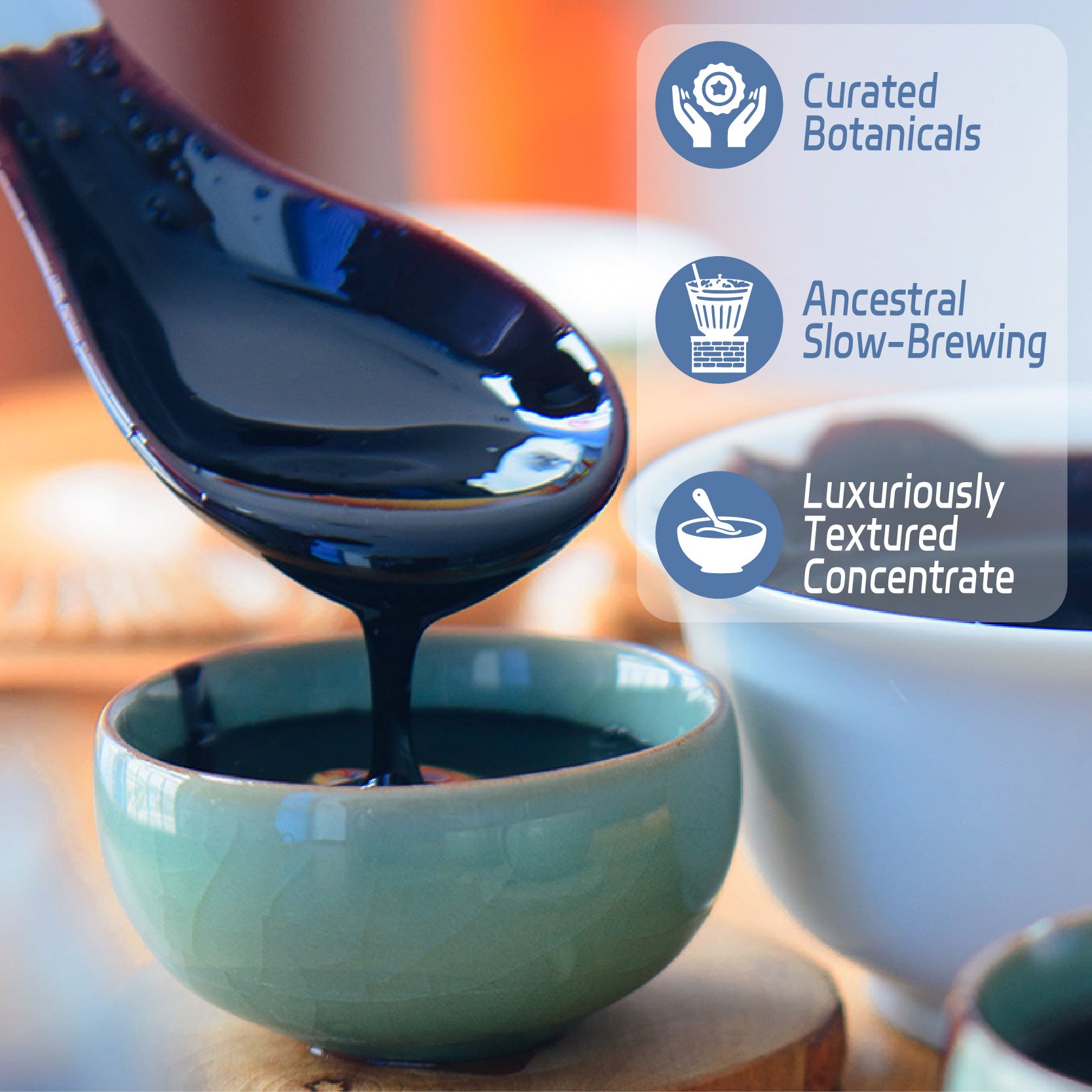
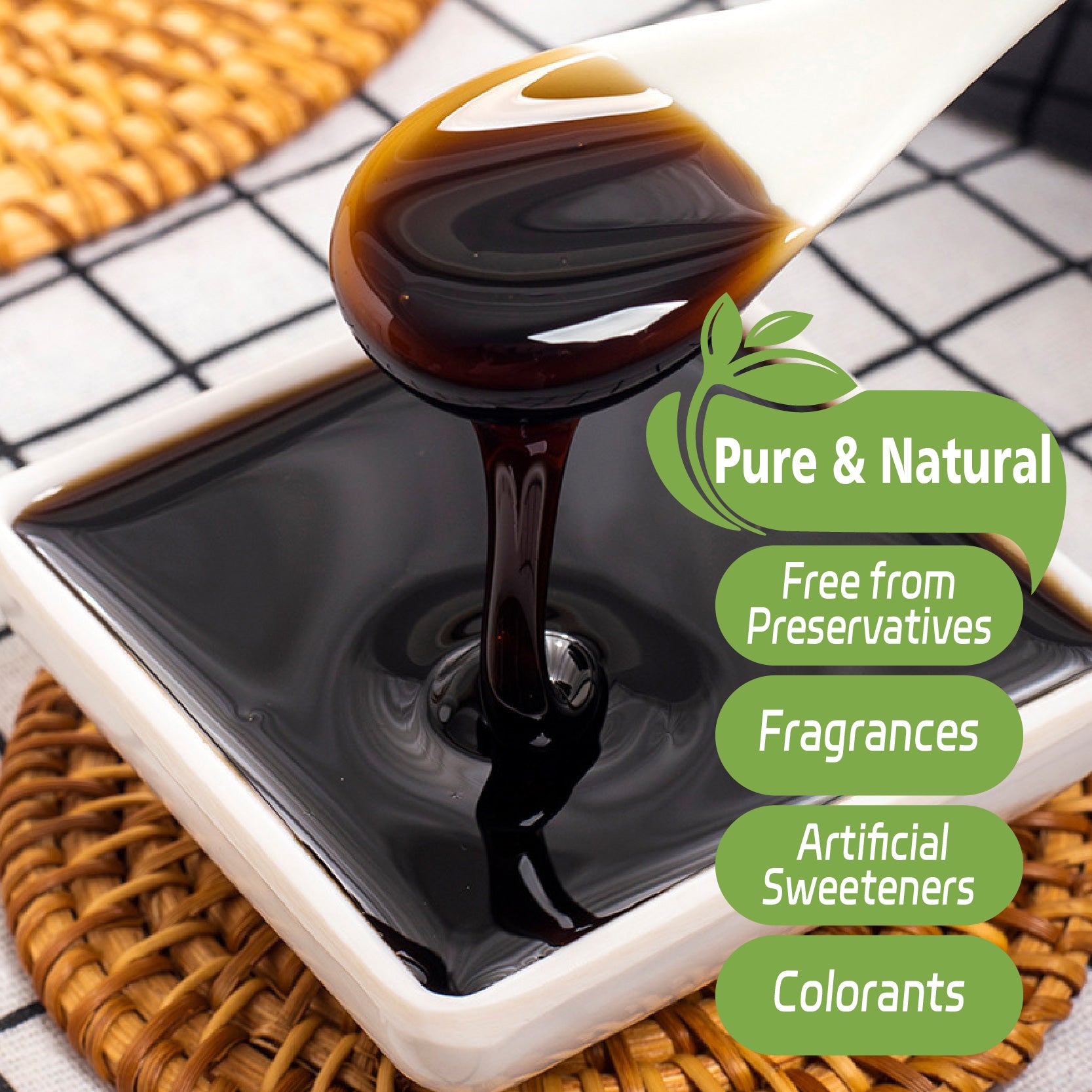
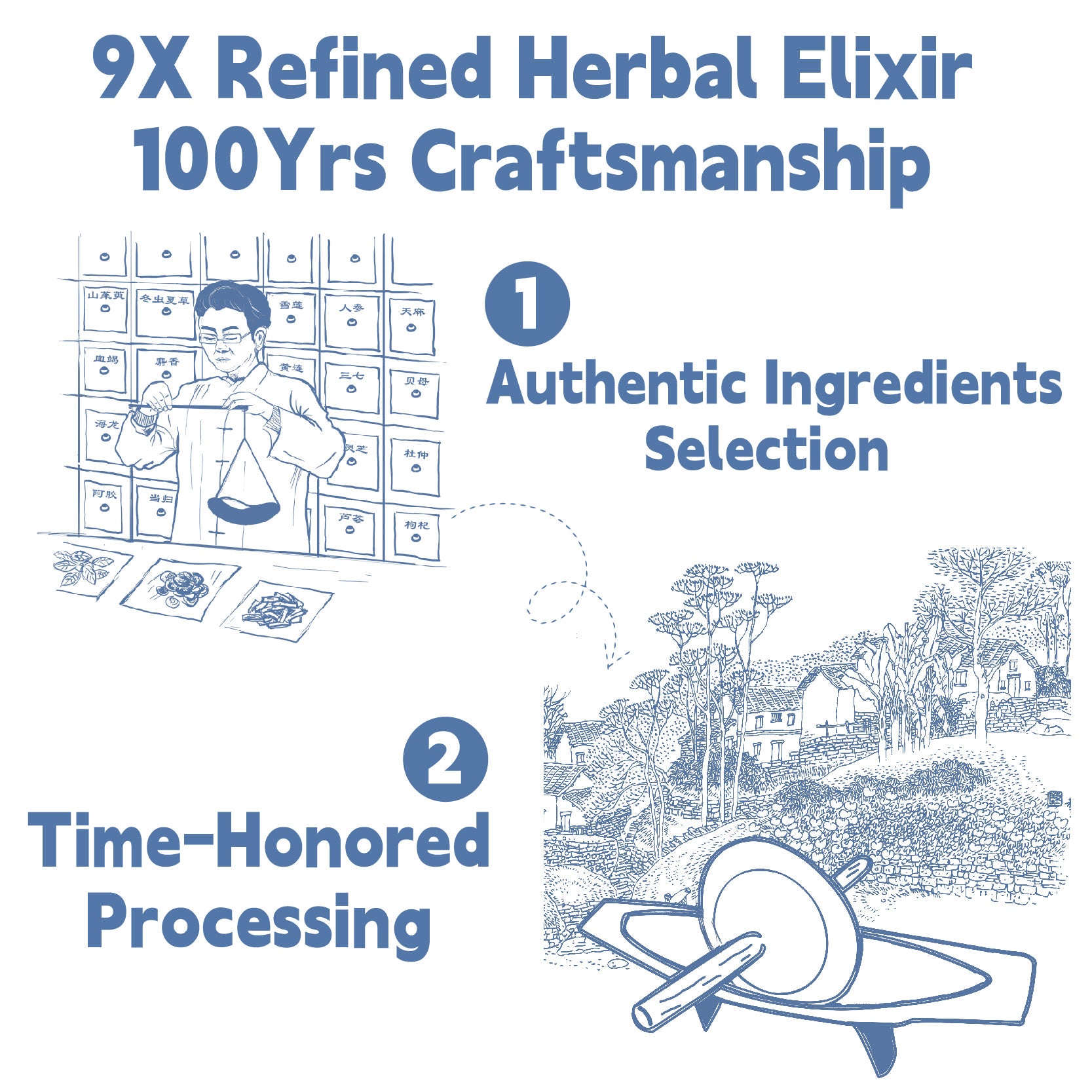
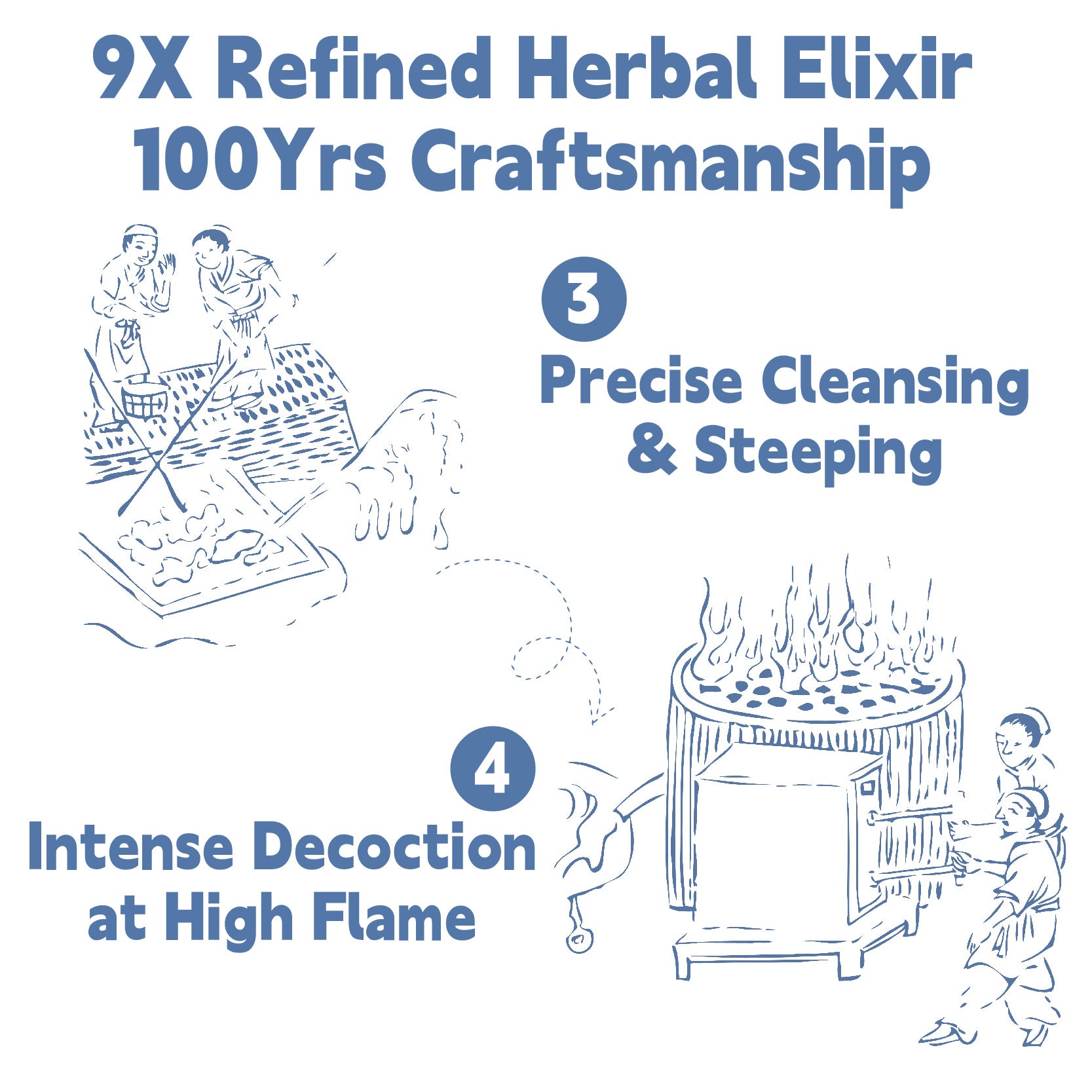
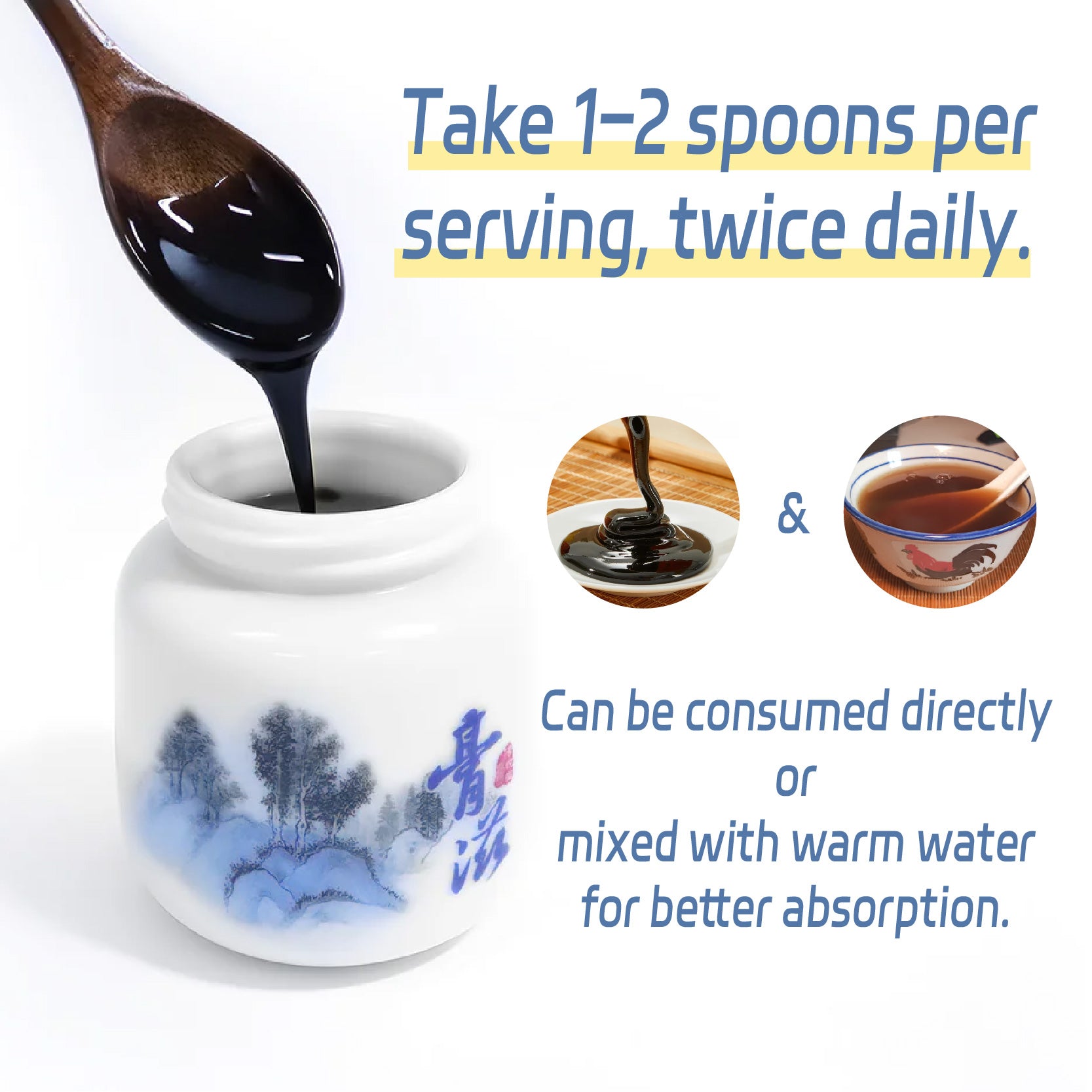

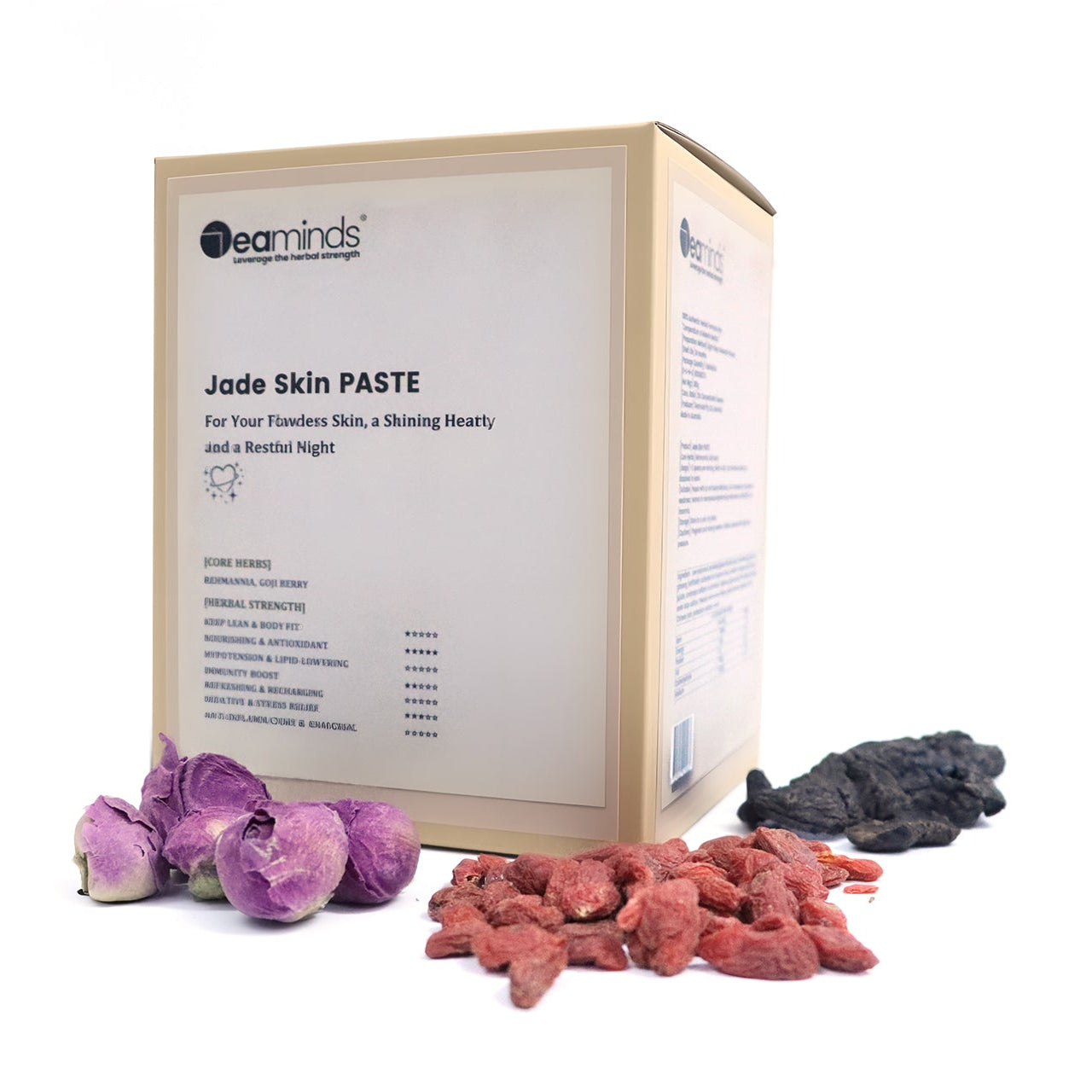
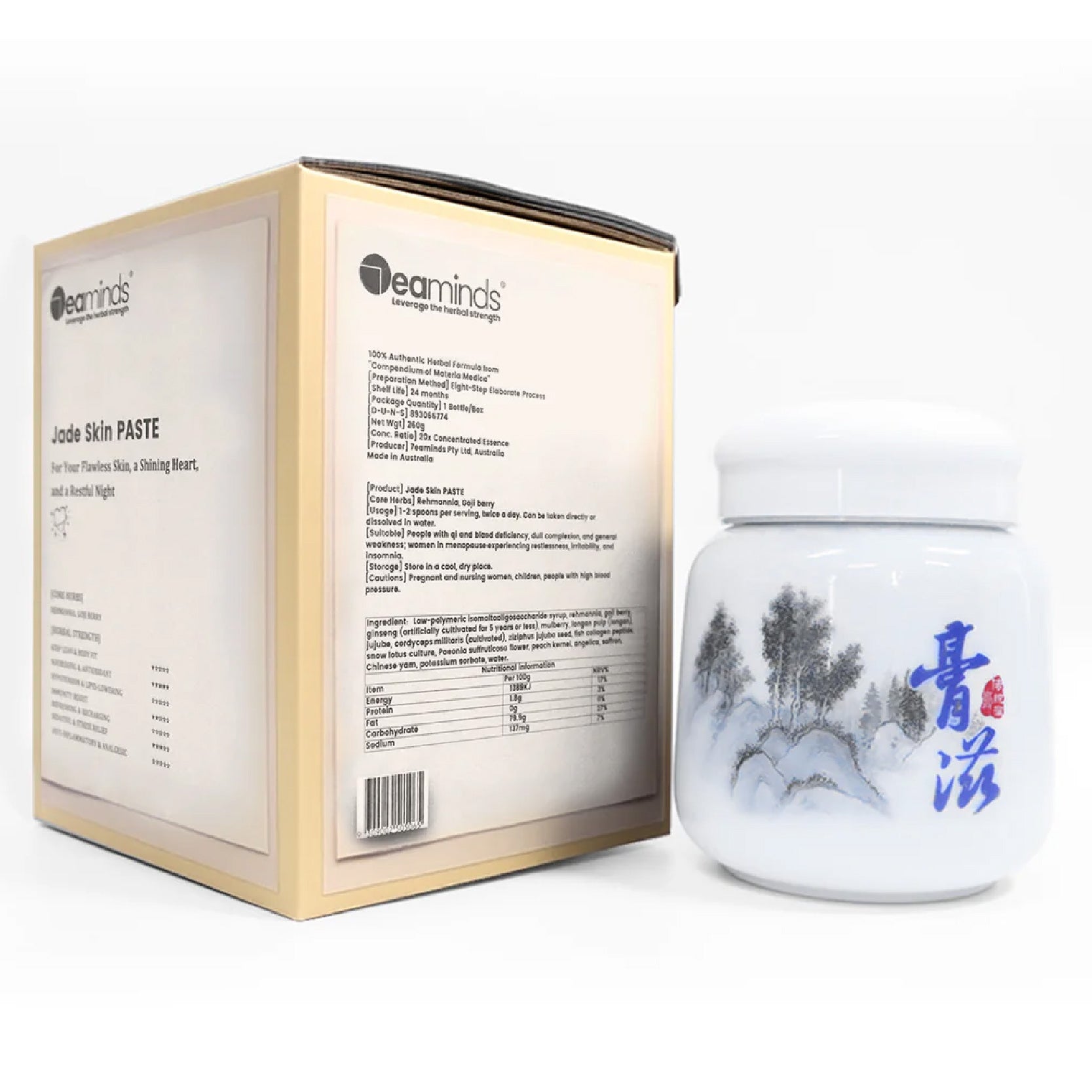
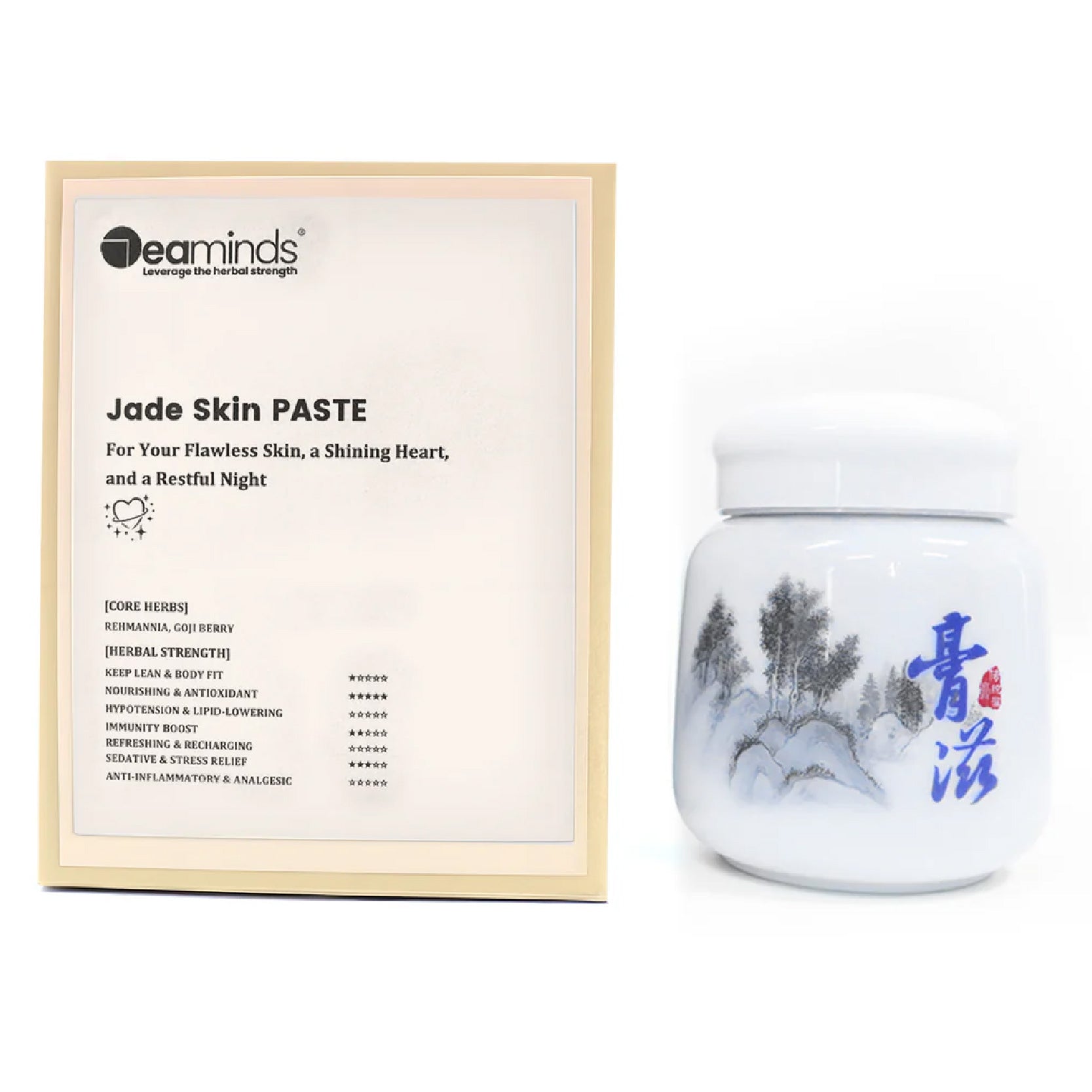
Jade Skin PASTE
🌿 Why choose us?
💨 Instant instant · No residue taste – smooth and pure in every bite
❄️ Freeze-drying technology – retains up to 99% herbal active essence
🚫 Zero additives – No sugar, no impurities
🧳 Standalone dose pack – small and portable, one tablet at hand, safe and healthy
⚡ Instantly Dissolves in 3 Seconds – Quick and convenient
🍃 100% Herbal Extract – Pure, chemical-free formulation
🌱 98% Nutrient Retention – Potent and effective
🔬 6x Concentrated Herbal Strength – One shot, full impact
❄️ 30-Minute Rapid Freshness Lock – Preserves aroma and potency
🥄 No Residue, Fully Dissolves – Clean and smooth
🌾 Core Herbs Grown on Our Own Farms – Quality from the source
All 7eaminds' products are developed in Australia. With the utmost sincerity, we pledge that for every product purchased, we will permanently donate 2% of our proceeds to charitable organizations. Please refer to 7eaminds.com for further information.
Choose options











Which Herbal Tea Method Delivers More?

Decoction-Based Herbal Tea ✅ (Our Formula)
Utilizing Dynamic Countercurrent Percolation Extraction Patent Technology, 7eaminds herbal tea achieves enhanced extraction of bioactive compounds through continuous solvent-material counterflow. Post-extraction concentration and spray drying yield:
Ø Higher potency: 37%
increased extraction efficiency compared to maceration
Ø Flavor intensity:
Oleoresin-rich profiles from supercritical fluid-assisted extraction
Ø Standardized actives:
Quantified polyphenol content via GC-MS analysis

Blending-Based HerbalTea ❌
A dry mixture of whole or powdered herbs, flowers, spices, or tea leaves designed for infusion, without pre-extraction processing.
Ø Unprocessed
ingredients: Whole/powdered herbs, spices or tea leaves
Ø Traditional
preparation: Hot water infusion releases compounds gradually
Ø Full-spectrum
benefits: Contains native plant fibers
Got a problem to enjoy?
The answer is, anytime. However certain herbal teas are better suited to support you at different points throughout the day. With the growing awareness of how herbs can help support the body and mind, there has never been a more exciting time to explore different herbal teas to enjoy throughout your day.
What we offer
7eaminds provide best time to drink for various herbs
The google answers will show the store address according to the searcher’s address
What we offer
7eaminds offer you a diverse range of herbal tea products. Additionally, we have established a comprehensive and continuously updated herbal knowledge base to assist you in easily and intuitively selecting the most suitable herbal teas for your needs, utilizing state-of-the-art cold extraction technology.
Numerous studies have shown that a variety of herbal teas may boost your immune system, fight off inflammation, and even ward off cancer and heart disease. While some brews provide more health advantages than others, there’s plenty of evidence that regularly drinking tea can have a lasting impact on your wellness.
What we offer
Embracing the philosophy of living in harmony with nature, 7eaminds utilize our meticulously crafted herbal knowledge matrix to provide you with comprehensive information on each herbal plant, including their benefits, composition, potential toxicity, and contraindications. This empowers you to make informed choices about the herbal teas that are right for you and your family, ensuring that every day is filled with health and vitality.
Herbal tea is made from a variety of plants, such as herbs, flowers, and fruits, and does not contain any actual tea leaves. It is known for its wide range of flavors and aromas and is often considered to be more healthful than other types of tea.When stored properly, herbal tea can last for up to two years. However, the flavour and aroma of the tea may start to fade after about 18 months.
What we offer
7eaminds utilize a sterile process to meticulously seal each product under a constant low temperature and dry environment, ensuring that it remains fresh for over 18 months from the date of packaging ,to maximize the shelf life of herbal tea, it is important to store it in an airtight container away from direct sunlight and moisture.
Herbs are frequently used as teas or infusions during pregnancy. However, there are no clinical trials and no evidence-based proof regarding their safety. They have been considered to be safe and so used for many years. Thus, their recommended consumption is to be limited to two cups per day during pregnancy AND depends their functions for various herbs
Most herbal teas should be avoided. Raspberry leaf, peppermint, ginger, and lemon balm tea are the only ones currently deemed as potentially safe. However, women may benefit from avoiding the first two during their first trimester of pregnancy.
The commended consumption is to be limited to two cups per day during pregnancy. Commonly used herbs during pregnancy were known to be raspberry, fennel, peppermint, ginger,Jujube, thyme, chamomile, sage and green tea.
Avoid parsley tea and sage during pregnancy. If you drink large amounts, it may increase your chance of miscarriage and affect how your baby develops.
What we offer
Medical experience tells us that pregnant women can drink some herbal tea in moderation, which can have a health effect. However, according to 7eaminds‘ research matrix, some herbal teas are not suitable for pregnant women to drink, such as rose tea. Rose tea can alleviate symptoms such as menstrual disorders and dysmenorrhea, but drinking rose tea that promotes blood circulation and dispels blood stasis may lead to miscarriage. So before drinking herbal tea, it is necessary to choose carefully based on one’s own physical condition.
7eamines research matrix shows that pregnant women can properly drink some herbal tea, such as buckwheat tea, which is rich in rutin, amino acids and trace elements. Drinking buckwheat tea properly for pregnant women can generally control blood sugar and prevent diabetes to some extent.
The study of 7eaminds suggests that infants have incomplete physical development, herbal tea may increase their gastrointestinal burden, cause allergic reactions, and cause discomfort. Therefore, it is not recommended for infants to drink herbal tea.
Herbal tea should never be given to a baby under 6 months of age because it could contain harmful bacteria or cause an allergic reaction.
When elderly individuals consume herbal teas, they should carefully select beverages that suit their health conditions, avoid excessive intake of herbs that might interfere with medication effects or cause adverse reactions, and consider the potential for chronic diseases and drug interactions.
What we offer
The study of 7eaminds suggests that infants have incomplete physical development, herbal tea may increase their gastrointestinal burden, cause allergic reactions, and cause discomfort. Therefore, it is not recommended for infants to drink herbal tea.
1.Not drinking in large quantities
Excessive consumption of herbal tea can accelerate the human heart rate and increase blood pressure. In addition, drinking a large amount of strong tea can dilute gastric juice, reduce its concentration, and cause symptoms such as indigestion, bloating, and abdominal pain. Therefore, it needs to be used in moderation.
2.Not drinking before bedtime
Some herbal teas have a refreshing, stimulating, and diuretic effect. Many elderly people may have sleep disorders, so try not to drink at night to avoid excitement, insomnia, polyuria, and affect sleep quality. However some herbals, such as Chamomile, Lavender,Jujube Seed,Poria may help with sleep and sedation.
3. Taking medication without drinking
Tannins in some herbal teas can react chemically with certain drugs, especially for elderly people who take hypnotic and sedative drugs, as well as iron and blood supplements, enzyme preparations, protein containing drugs, etc. It is not advisable to use tea water to deliver drugs, so as not to affect the efficacy.
Peppermint tea and spearmint tea are two to consume with care if you have acid reflux. While they both come loaded with soothing properties for the digestive system, drinking too much can trigger your condition. Also, skip out on the sugar and lemons when prepping your herbal tea as these too can heighten acidity.
What we offer
For individuals who are prone to excess stomach acid, 7eaminds research advises to avoid herbal teas that may stimulate the secretion of stomach acid, such as mint, ginger, and certain types of citrus herbs, as these ingredients could exacerbate symptoms of excess acid. Instead, one could opt for herbs that help neutralize stomach acid or provide a protective effect on the gastric mucosa, like licorice, Fritillaria cirrhosa, and Poria cocos.
Herbal tea blocks a certain hormone in your body that keeps your blood vessels open so your blood can pass through easily. This can increase your blood pressure temporarily, but there is no sufficient evidence that it will increase your blood pressure in the long term.
What we offer
The study of 7eaminds suggests that some herbal teas have a certain antihypertensive effect on patients with mild hypertension. There are many herbaceous plants in nature that have the effect of reducing blood pressure, such as chrysanthemums. The effective ingredients in these herbs can play a certain role in relaxing blood vessels and lowering blood pressure. Therefore, moderate consumption of some suitable herbal tea can help improve mild blood pressure elevation. But for severe hypertension or other complications, it is necessary to use standardized drugs for treatment under the guidance of a doctor.
Herbal tea is made with different kinds of fruits, spices and herbs. If your herbal tea is packed with fruit, the sugars in the fruit could break your fast. Some great options of herbal teas that won’t break your fast are single-ingredient herbal teas, like peppermint tea, chamomile tea, or ginger tea or mix tea without sugars or fruit.
What we offer
The study of 7eaminds suggests that during fasting, we can generally drink tea and avoid using any additives. We should choose natural, unadded tea, such as white tea, green tea, and some fresh herbal teas, such as mint, lemon, chamomile, etc. However, we should also avoid drinking rich tea and avoid excessive consumption, which may have an impact on our digestive system.
Almost all herbal teas are Caffeine-Free. Herbal “tea” is not technically tea, because it is not made from the Camellia Sinensis plant. instead, the more appropriate name for an herbal tea is a “tisane” or “infusion.” Herbal teas are made from any combination of citrus or berry fruits, herbs, and spices and are naturally caffeine-free.
What we offer
Traditional teas, such as black, green, white, and oolong teas contain caffeine, which may affect your hydration status. Besides a few exceptions, most herbal teas don’t contain caffeine and are generally considered hydrating.
Can herbal tea cause constipation? There are a wide variety of herbal teas that can affect the body in many ways, and some may cause constipation, such as drink too much green tea or rhubarb tea.
What we offer
eg. teas include senna, slippery elm, and rhubarb teas,elderberry,fennel,black tea
Some detox teas are harmless mixes of tea leaves no different than regular teas. But a few herbs contain additional ingredients that could harm your health. Such ingredients may include: powerful herbs, like senna, which can cause diarrhea when overused.
What we offer
Improper use of herbaceous plants may lead to diarrhea and damage your health. 7eaminds will help you avoid this risk, prioritize your health, and choose herbaceous plants that are suitable for your physical health. For example, do not use herbaceous plants such as senna that have a significant impact on gastrointestinal function. Additionally, 7eaminds will provide you with the most reasonable dosage recommendation.
Herbal teas are made through a process that uses roots, leaves, seeds and flower parts found in herbal medicine. The draining effect may have a diuretic effect. Water and the extracts handled to prepare infusions stimulate diuresis or the expulsion of urine and some waste with it which may be good for weight loss and body shaping
What we offer
Hibiscus, rose or chamomile are great options because they’re caffeine-free and will have less diuretic effects.
Herbal teas generally considered a low-risk beverage for causing gas or bloating. However, certain types of herbal teas, such as those with ingredients known to cause gas in some individuals, might be worth avoiding if you’re prone to digestive discomfort.
What we offer
Herbal concentrated tea contains substances such as tannic acid and tea polyphenols, which may cause certain irritation to the gastrointestinal tract. If consumed excessively, it may cause discomfort symptoms such as abdominal pain and bloating. 7eaminds will provide you with the most reasonable dosage recommendation.
Herbal teas—which contain single herbs (like a mint tea) or a blend of multiple herbs—are popular options, and usually don’t have any effect on headaches.
What we offer
Moderate consumption of herbal tea can not only help you relieve emotions and improve headaches, but also aid in digestion, moistening the intestines, promoting bowel movements, and improving sleep quality. However, excessive consumption of herbal tea can lead to tea polyphenol intolerance or theophylline allergy, which may manifest as gastrointestinal discomfort, palpitations, dizziness, headache, insomnia, anxiety, allergic reactions, etc.Therefore, 7eaminds will guide you to drink in a standardized manner and safeguard your health.
Many researches show herbal teas are a fantastic alternative to water. As well as hydrating, they are high in antioxidants, calming and caffeine free.
What we offer
The herbal tea of 7eaminds meets the requirements of a sugar free, salt free, fat free, and additive free healthy beverage, and can also provide a lot of trace elements and polyphenolic antioxidants. Research has shown that many herbal teas are beneficial for improving immunity and maintaining physical health.
Viewing things objectively, everything has two sides. Tea has high oxalate content and oxalic acid aid in the forming of kidney stones. So the answer is maybe, drinking too much tea can lead to the formation of kidney stones.
What we offer
Many herbal teas contain abundant oxalic acid, which can react chemically with calcium substances in the human body to form calcium oxalate. Calcium oxalate cannot be absorbed by the human body and can deposit in the kidneys to form kidney stones. Therefore, 7eaminds suggests that it is important to follow the principle of moderation, pay attention to adjusting the strength of the tea, avoid drinking on an empty stomach, and ensure a diversity of types consumed. This allows you to fully enjoy the benefits of herbal teas while maintaining good health.
Volume, high volume intake everyday of black, green teas and coffee which contain tannins naturally stain teeth and gums.
What we offer
Many herbal teas contain abundant substances such as tea polyphenols, theophylline, and pigments. If one drinks tea excessively for a long time and does not brush their teeth in a timely manner after drinking tea, these substances may deposit on their teeth and over time, cause them to turn yellow. If the teeth only turn slightly yellow and there are no symptoms such as tartar, plaque, or bad breath, 7eaminds recommend that everyone brush their teeth frequently, especially after drinking herbal tea, to avoid tea stains accumulating on the teeth and exacerbating yellowing.
Herbal teas aren’t technically made from tea leaves but rather from dried flowers, leaves, seeds, or roots of other plants. As a result, they are naturally caffeine-free, per the Harvard T.H. Chan School of Public Health, and can be counted the same as water cup for cup when it comes to hydration.
What we offer
Herbal tea can be consumed as water, but it is important to pay attention to the amount consumed. Excessive consumption may cause discomfort, and it is recommended to limit daily consumption to 2-3 cups. 7eaminds suggest that drinking herbal tea can be combined with a healthy lifestyle, such as a balanced diet, moderate exercise, good sleep, etc., to achieve the overall effect of body health preservation.
Herbal teas that can help alleviate gastric acid reflux, such as those containing chamomile, licorice, and barley, or black tea, Pu-erh tea, and dried tangerine peel (chenpi), are recommended. It is advised to drink them in moderation according to one’s specific symptoms and physical condition, and to pay attention to the way of drinking tea, such as avoiding drinking tea on an empty stomach.
Our herbal matrix is a culmination of extensive experience and rich knowledge. In the journey of creating 7eaminds, we have been dedicated to collecting valuable suggestions from professionals and end-users, integrating this refined information into our matrix to help every user identify and select herbal solutions suitable for themselves and their families.
Herbal teas such as Fritillaria, Chamomile, Aster, Stemona, and Platycodon are traditionally used to soothe cough symptoms due to their natural calming and anti-inflammatory properties. These teas help alleviate cough discomfort by moistening the lungs, expelling phlegm, and suppressing cough, but it is recommended to consult with healthcare professionals before drinking to ensure they are suitable for your health condition and will not cause adverse reactions.
Our herbal matrix is a culmination of extensive experience and rich knowledge. In the journey of creating 7eaminds, we have been dedicated to collecting valuable suggestions from professionals and end-users, integrating this refined information into our matrix to help every user identify and select herbal solutions suitable for themselves and their families.
Herbal teas such as chamomile, peppermint, ginger, and fennel teas are believed to help alleviate symptoms of diarrhea due to their properties of soothing the stomach and intestines, antibacterial and anti-inflammatory effects, and regulation of intestinal function. The ingredients contained in these teas can help reduce gastrointestinal inflammation, balance the gut flora, thereby easing the discomfort caused by diarrhea.
Our herbal matrix is a culmination of extensive experience and rich knowledge. In the journey of creating 7eaminds, we have been dedicated to collecting valuable suggestions from professionals and end-users, integrating this refined information into our matrix to help every user identify and select herbal solutions suitable for themselves and their families.
Studies have shown that tea containing the following herbal ingredients may help individuals with mild to moderate hypertension lower their blood pressure, hibiscus, hawthorn, lotus leaf,chrysanthemum, green tea, cassia seed, these herbal teas may work through different mechanisms, such as promoting blood vessel dilation, reducing the load on the heart, or improving vascular health.
7eaminds provide “Hypotension and lipid-lowering” matrix as reference for you to acknowlage and choose the suitable herb.
Among herbal teas, some are believed to help alleviate pain due to their natural anti-inflammatory and analgesic properties, such as herbal teas containing ginger, chamomile, ginseng, and others which have certain analgesic effects. It should be noted that although these herbal teas may have analgesic effects, they cannot replace medical treatment. If the pain is persistent or severe, one should consult with medical professionals.
Our herbal matrix is a culmination of extensive experience and rich knowledge. In the journey of creating 7eaminds, we have been dedicated to collecting valuable suggestions from professionals and end-users, integrating this refined information into our matrix to help every user identify and select herbal solutions suitable for themselves and their families.
There are various herbal teas that can help alleviate sore throats, such as teas containing berries, honeysuckle, chrysanthemum, sage, licorice, ophiopogon, fat-sea-fig, and monk fruit. When choosing the right herbal tea, you can decide based on personal taste and specific symptoms. At the same time, maintaining good lifestyle habits, such as drinking plenty of water and avoiding spicy foods, can also help relieve sore throat pain.
7eaminds provide “Anti-inflammatory and heat-clearing” matrix as reference for you to acknowlage and choose the suitable herb.
Herbal teas that are believed to aid in weight loss typically contain ingredients that can boost metabolism, suppress appetite, or increase feelings of fullness. Green tea and oolong tea with lotus leaf, ginger, yerba, peppermint that are thought to potentially assist with weight loss.
7eaminds provide “Keep lean and body shaping” matrix as reference for you to acknowlage and choose the suitable herb.
Herbal plants that can help lower cholesterol include Cassia tora, Polygonum multiflorum , hawthorn, Ginkgo biloba leaves, turmeric, and Panax ginseng. These plants contain natural compounds such as anthraquinones, plant sterols, and polysaccharides, which can promote the excretion of cholesterol, inhibit the absorption of cholesterol, or improve lipid metabolism, thereby helping to reduce blood lipid levels.
7eaminds provide “Hypotension and lipid-lowering” matrix as reference for you to acknowlage and choose the suitable herb.
Herbal plants that contribute to heart health include hawthorn, danshen, American ginseng, garlic, turmeric, green tea, ginkgo biloba leaves, and ginseng, among others. These herbs contain active components such as flavonoids, saponins, and curcumin, which can improve blood circulation, enhance myocardial function, and reduce blood pressure and cholesterol levels, thereby helping to maintain heart health and prevent cardiovascular diseases.
Our herbal matrix is a culmination of extensive experience and rich knowledge. In the journey of creating 7eaminds, we have been dedicated to collecting valuable suggestions from professionals and end-users, integrating this refined information into our matrix to help every user identify and select herbal solutions suitable for themselves and their families.
Some great options of herbal teas that won’t break your fast are single-ingredient herbal teas, like peppermint tea, chamomile tea, or ginger tea.
Our herbal matrix is a culmination of extensive experience and rich knowledge. In the journey of creating 7eaminds, we have been dedicated to collecting valuable suggestions from professionals and end-users, integrating this refined information into our matrix to help every user identify and select herbal solutions suitable for themselves and their families.
As herbal teas work as an anti-depressant, they work by calming the mind and releasing chemicals in the brain that effectively fight off anxiety and stress.
7eaminds provide “Refreshing and Awakening the Brain” matrix as reference for you to acknowlage and choose the suitable herb.
Herbal plants can indeed help boost immunity due to their natural compounds, such as polyphenols and immunomodulatory substances, which strengthen the body’s resistance to diseases. For instance, herbs like ginseng, astragalus, goji berries, and dendrobium are widely used to enhance the function of the immune system.
7eaminds provide “Immunity and disease resistance” matrix as reference for you to acknowlage and choose the suitable herb.
Herbal Teas like Chamomile Tea, Mint Tea and Fennel Teas are very close to neutral, ranging between 6-7 on the pH scale, while Fruit Teas like Blackberry and Rosehip are very acidic, ranging between 2-3 on the pH scale.
Most herbal teas, green tea, rooibos, and yerba mate have an alkalizing effect which can work to neutralize acidity in the body.
What we offer
When stored properly, dehydrated herbal tea can last for up to two years. However, the flavour and aroma of the tea may start to fade after about 18 months. To maximize the shelf life of herbal tea, it is important to store it in an airtight container away from direct sunlight and moisture.
A number of studies have shown that certain teas can boost your immune system, fight off inflammation, promote cardiovascular health, and even prevent the development of certain cancers. These health benefits are associated with specific antioxidants found in tea, known as polyphenols.
Yet many of the adverse effects of herbal tea come from interactions with medications. For example, when combined with herbal teas, blood thinners and aspirin can cause liver and kidney damage.
What we offer
Avoid herbal teas that contain added sugar and other additives. Herbal tea should not be used as a substitute for medical treatment.
7eaminds herbs are the original liquid or crystals extracted from herbs which are completely soluble in water and free of impurities.
Nettle tea, chamomile tea, and dandelion root tea are not only soothing but also magnesium-rich options.
Despite the name, herbal tea is not actually “tea” as these beverages typically do not contain the leaves or leaf buds of tea plants. Herbal teas are made from tisanes, which are blends or infusions of dried fruits, flowers, spices or herbs in water. Tisanes have been shown to offer medicinal effects.
In general, when your physical condition is stable, regular consumption of herbal tea can bring you many benefits; however, overindulgence in any beverage may lead to some adverse side effects. We recommend that you drink 2-3 cups daily, and let 7eaminds be your daily companion on the path to a healthy life.
Varieties include ginger, ginkgo biloba, ginseng, hibiscus, jasmine, rosehip, peppermint, rooibos (red tea), chamomile, and echinacea. Green and white teas, and low-oxidation oolongs tend to contain little to no tannins, although they are rich in the chemically-similar catechins, sometimes classified as pseudotannins.
Some herbal supplements that interact with warfarin are ginger, alpha plant, garlic, green tea, urtica dioica, turmeric, onions, mango and grapefruit, and Chinese herbs including danshen (Salvia miltiorrhiza), gegen (Pueraria lobata), seven tannin (diuretic and astringent herb),chamomile tea, trigonella foenum, graecum

